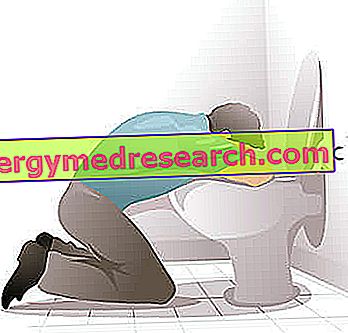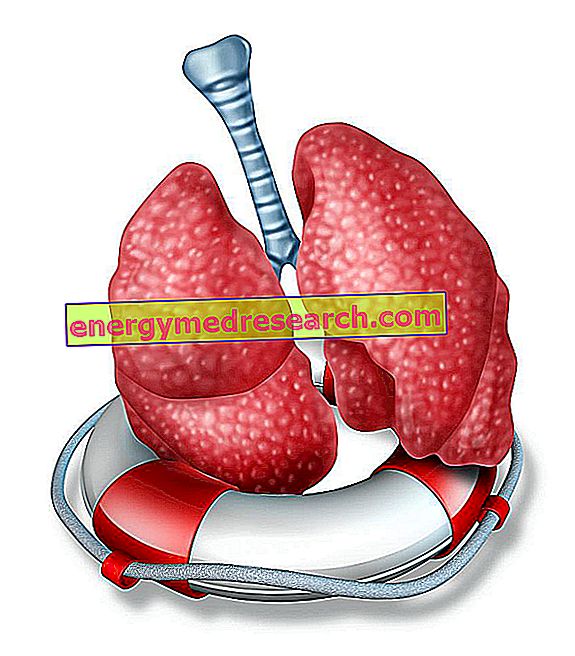See also: Vomiting and anti-emetic drugs
Generality
Vomiting, or emesis, consists of the forced expulsion of the gastric contents through the mouth. It is not a voluntary act, but an event reflected with a precise physiological meaning; vomiting, in fact, is a defense aimed at removing substances - recognized as toxic - from the stomach, before they can be absorbed and cause damage to the body.

As anticipated, vomiting is generally preceded by nausea (urgent need to vomit) and by so-called retching (spasmodic breathing movements).
Causes of the Vomiting
See also: Vomiting - Causes and Symptoms
The morbid conditions in which this defensive reflex is observed are varied and numerous, but all referable to a stimulation of the bulbar center of vomiting. At this level multiple afferents come, coming from various districts of the organism; this explains why the causes of vomiting are so different and numerous. The main ones have an indirect origin, such as acute or chronic diseases of the digestive system (gastritis, peptic ulcer, enteritis), gastric or intestinal stenoses and obstructions (in this case the appearance of vomiting after a meal is as early as possible high is the seat of the occlusion), irritation of the peritoneum (appendicitis, peritonitis, acute pancreatic necrosis), occlusion of the excretory or biliary tract, stimulation of the vestibular nerve and motion sickness (as occurs in car journeys, air or water), violent pain, ingestion of spoiled food or large amounts of liquids or food, prolonged fasting, infectious / febrile states in the pediatric age, some drugs, strong sensory stimuli (a particularly pungent odor, a somewhat disgusting taste etc.), radio and chemotherapy, pregnancy (especially in the first months), metabolic and / or dysendocrine alterations (diabetes, uremia, hyperparathyroidism, ketoacidosis, Addison's disease) and emotional factors. The bulbar center of the vomit can also be stimulated directly, as happens - for example - in all those situations that increase intracranial pressure (brain tumors and haemorrhages, head traumas, etc.), in psychoses, in exposure to a excessive heat or following the use of drugs that act directly on it, such as apomorphine and digitalis.
Mechanism of vomiting
The vomiting center, in addition to receiving numerous afferents, is also able to send multiple signals to allow the expulsion of the gastric contents. Taken together, these impulses close the glottis and raise the soft palate (to prevent the entry of vomit into the respiratory tract which, when it occurs, can cause pneumonia ab ingestis) and the pylorus (which joins the stomach to the intestine); cardias tone decreases (the valve that unites the esophagus and stomach); fix the diaphragm in inspiratory position (with increase of intra-abdominal pressure); finally, with the collaboration of the intercostal, diaphragmatic and abdominal muscles, they trigger movements of inverse peristalsis that make the contents of the stomach flow back to the mouth (vomiting).
When to worry and consult a doctor immediately?
Often the appearance of vomit makes us regret a binge with friends, of having swallowed hard to digest food, or of having come out with clothes that are too light. Sporadic episodes, symptoms of a mild and transient malaise should not worry the patient excessively; different speech in all those cases in which vomiting occurs systematically, appears in conjunction with a well-known pathology or severe symptoms of another nature (high fever, severe abdominal pain, yellow coloring of the skin), assumes a particularly expressive color (blood vomiting or bilious, therefore red-black yellow-greenish) or a nauseating smell (fecaloid vomit), or when more episodes are repeated a short distance of time. In the latter case, especially when associated with diarrhea, vomiting becomes dangerous - especially for children - because it causes severe dehydration. The inability to undertake oral rehydration therapy requires, in some cases, an infusion of physiological intravenously. The cause of the simultaneous presence of vomiting and diarrhea is often represented by an acute gastroenteritis (intestinal flu).
Treatment and treatment of vomiting
See also: Vomiting - Medicines for Vomiting
In addition to treating any dehydration, vomiting should be cured in the first instance, identifying and treating the disease or condition that caused it appropriately. If it has iatrogenic origins (it is caused by drugs), for example, it is generally sufficient to suspend the treatment or adopt an alternative one; in other cases, when vomiting is the consequence of neurosis, psychotherapy is recommended to eliminate the excess of anxiety, irritability and emotion (even anxiolytic drugs - sedatives can be useful). Particular attention during pregnancy, during which many drugs (including a large part of antiemetics) are contraindicated for the possible damage they could cause to the fetus; The remedies to counter the nausea that often accompanies this magical period are listed in this article.
In the presence of vomiting, phytotherapy relies on the anti-emetic virtues of ginger (especially effective in pregnancy), to be taken in doses of 1-3 grams a day.
Read also: Vomiting Remedies »



